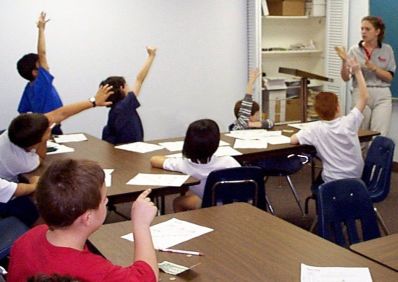
IMACS students in a math enrichment class.
Former IMACS instructor, Brandi Parsell, offers advice on how to address the ultimate question in a way that stimulates logical reasoning and critical thinking skills.
It can be endearing, or at times downright frustrating – that eternal question, “why?”. When bright children discover that single word, they seem to grab onto it and won’t let go. Sometimes the answers are simple, and sometimes we find ourselves at a complete loss for words.
This innocent question, however, is a signal to parents that a child is ready to be challenged to think logically. The creativity is there – we can see it in their everyday play. It is how we encourage that creativity and shape it into critical thought that will form a solid basis for a child’s learning ability.
Critical thinking is one of the hardest subjects to teach older students; any schoolteacher will tell you so. But if you begin to give your children the necessary tools when they are as young as three or four years old, they can develop these skills more easily. When the question of “why” is put once again on the table, the best policy is to ask, don’t tell. Challenge your children; ask what they think the reason might be. Chances are you will be pleasantly surprised.
Often parents believe that when their child reaches school age, he or she will at last find satisfaction for that curiosity. Talented students, though, may become bored with traditional school curriculum. When such a student is not challenged to exceed our expectations, this frustration often takes the form of careless errors and lack of effort. If children begin to develop these kinds of bad habits, too often they give up quickly when faced with a truly challenging problem. It is important that bright students are encouraged to go beyond what is merely “expected” of them.
“Talented students owe it to themselves to stretch their minds as far as they can,” said Burt Kaufman, co-founder of IMACS. Burt spoke from experience. For over 40 years he worked closely with bright pre-college students and developed challenging mathematics curriculum materials to stimulate them to become true students – disciplined logical thinkers with an insatiable thirst for knowledge and understanding.
Parents are a child’s first teachers, and the best teachers don’t give away the answers. Turn your child into a detective, and yourself into their greatest source for clues.
An IMACS foundation in logical thinking sets students on a path to successful learning. Take our free aptitude test to begin your IMACS journey.









I love this article because, as a mother of a precocious preschooler, I know how true it is that parents really are a child’s first teacher. If we leave the teaching up to their teachers at school, it’s too late, and we wouldn’t be doing our job. We as parents have the privilege of nourishing the natural curiosity of our children, and we get to help push them to be all they can be. Kids thrive on rising to their parents’ expectations when they’re young. If we believe that they’re smarter than they “should be” at their age, they will rise to our expectations because it’ll be normal. If we don’t push them to do their best, how can we expect them to do so for themselves? I’m not saying we need to make them do flashcards at 6 months old, but encouraging them from a young age to think harder about everyday experiences, and deliberately teach them something new every day really helps their brain and thinking skills develop. It is soo important to be your child’s #1 cheerleader when they’re learning- when they see you getting excited that they’re learning, they’ll learn to get excited just to learn! It’s a great cycle! When they ask us “why?”, and we ask them “Why do you think?”, it opens up a whole new way of thinking that they hadn’t thought of yet- and might not have been able to come up with on their own. Critical thinking is a skill your children will use for the rest of his life. The sooner it’s taught and applied, the better your child will do in that area later on. I am a huge fan of IMACS’ way of thinking- that children have SO much potential, and we as parents can give them the tools they need to unlock it. What an honor!
Jennifer, thank you for your enthusiastic and thoughtful comments. Attitude towards learning and the development of critical thinking skills form a powerful feedback loop that can go in a positive or negative direction. At IMACS, we strongly encourage parents to start young children out in the right direction and to keep reinforcing this mindset throughout their growing years.